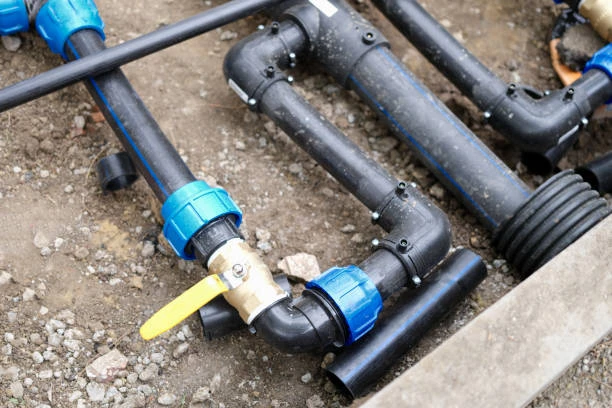In the ever-evolving landscape of construction and infrastructure, Agru America has emerged as a significant player in the manufacturing of high-density polyethylene HDPE pipe. Known for their durability, flexibility, and environmental benefits, HDPE pipes are increasingly in demand across various industries. This article delves into the innovative processes behind Agru America’s massive HDPE pipe production, the applications of these pipes, and the future of HDPE in infrastructure development.

What are HDPE Pipe?
High-density polyethylene (HDPE) pipes are made from thermoplastic polymer, known for their high strength-to-density ratio. They are widely used in water management systems, sewage disposal, and various industrial applications due to their numerous advantages over traditional materials like metal or concrete.
Advantages of HDPE Pipe
- Durability: HDPE pipes are resistant to impact and do not corrode or rust, making them ideal for long-term use.
- Flexibility: Their flexibility allows for easier installation and the ability to withstand ground movement.
- Lightweight: HDPE pipes are significantly lighter than metal pipes, which simplifies handling and installation.
- Chemical Resistance: HDPE is resistant to many chemicals, making it suitable for a variety of industrial applications.
- Cost-Effective: The long lifespan and low maintenance costs of HDPE pipes contribute to overall savings in infrastructure projects.
Agru America: A Leader in HDPE Pipe Manufacturing
Agru America has positioned itself as a leader in the HDPE pipe manufacturing industry. With state-of-the-art facilities and a commitment to quality, Agru produces massive HDPE pipes that meet the rigorous standards of modern infrastructure demands.
Innovative Manufacturing Processes
Agru America employs advanced manufacturing techniques to produce HDPE pipes. Their processes are designed to ensure high-quality outputs while maintaining efficiency. Some key aspects of their manufacturing include:
- Extrusion Technology: Agru utilizes cutting-edge extrusion methods, allowing for the production of pipes with consistent dimensions and properties.
- Quality Control: Each batch of HDPE pipes undergoes strict quality control tests to ensure compliance with industry standards.
- Sustainability Practices: Agru America is committe to sustainability, using recycled materials whenever possible and implementing energy-efficient manufacturing processes.
Applications of Agru’s HDPE Pipe
Agru’s massive HDPE pipes are utilize in various sectors, highlighting their versatility:
- Water Supply Systems: HDPE pipes are essential for transporting potable water efficiently, ensuring safe and reliable access to clean water.
- Wastewater Management: Agru’s pipes are widely use in sewer systems and treatment facilities, providing an effective solution for waste disposal.
- Agricultural Irrigation: The agricultural sector benefits from HDPE pipes, which help in efficient irrigation systems, conserving water and increasing crop yield.
- Industrial Applications: Many industries use HDPE pipes for chemical processing and transport, taking advantage of their resistance to corrosion and chemicals.
The Future of HDPE Pipe Manufacturing
The future of HDPE pipe manufacturing looks promising, particularly as industries continue to recognize the benefits of this versatile material. Several trends are shaping the future landscape:
1. Growing Demand for Sustainable Solutions
As environmental concerns increase, the demand for sustainable materials in construction is on the rise. HDPE pipes, being recyclable and durable, align well with this trend.
2. Technological Advancements
Innovations in manufacturing technology are leading to more efficient production processes. Automated systems and smart manufacturing practices are becoming more common, enabling companies like Agru to enhance productivity and reduce costs.
3. Expansion in Emerging Markets
Emerging economies are investing heavily in infrastructure development, creating significant opportunities for HDPE pipe manufacturers. Agru America is strategically positione to take advantage of this growth.
4. Regulatory Support for Infrastructure Investment
Governments are increasingly recognizing the importance of modernizing infrastructure. Supportive policies and funding initiatives can drive demand for HDPE pipes in water management and waste treatment projects.
5. Focus on Innovation
Continuous research and development are crucial for improving HDPE pipe products. Agru America is committe to innovation, exploring new applications and enhancing existing products to meet the evolving needs of the market.
Conclusion
Agru America’s commitment to producing massive HDPE pipes is reshaping the landscape of infrastructure development. With their numerous advantages, including durability, flexibility, and cost-effectiveness, HDPE pipes are becoming the preferred choice for various applications. As the deman for sustainable and innovative solutions continues to grow, Agru America is poised to lead the way in the HDPE pipe manufacturing industry.
The future of HDPE pipes is bright, driven by advancements in technology, sustainability initiatives, and increased investment in infrastructure. Agru America’s role in this dynamic market will undoubtedly be significant as they continue to innovate and deliver high-quality products.
FAQs
- What are the primary uses of HDPE pipes? HDPE pipes are primarily use for water supply, wastewater management, agricultural irrigation, and industrial applications.
- How long do HDPE pipes last? HDPE pipes can last over 50 years when properly installed and maintained, making them a durable option for infrastructure projects.
- Are HDPE pipes environmentally friendly? Yes, HDPE pipes are recyclable and made from materials that contribute to sustainability in construction.
- What makes Agru America a leader in HDPE pipe manufacturing? Agru America’s commitment to quality, innovative manufacturing processes, and sustainability practices sets them apart in the HDPE pipe industry.
- How do HDPE pipes compare to traditional materials? HDPE pipes offer advantages such as lower weight, resistance to corrosion, flexibility, and longer lifespan compared to traditional materials like metal or concrete.


















